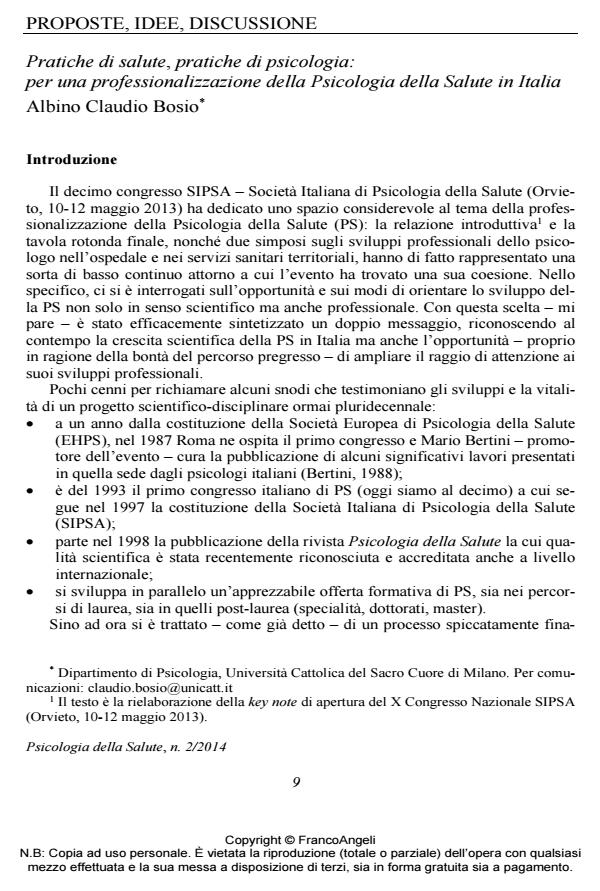Pratiche di salute, pratiche di psicologia: per una professionalizzazione della Psicologia della Salute in Italia
Titolo Rivista PSICOLOGIA DELLA SALUTE
Autori/Curatori Albino Claudio Bosio
Anno di pubblicazione 2014 Fascicolo 2014/2
Lingua Italiano Numero pagine 17 P. 9-25 Dimensione file 312 KB
DOI 10.3280/PDS2014-002002
Il DOI è il codice a barre della proprietà intellettuale: per saperne di più
clicca qui
Qui sotto puoi vedere in anteprima la prima pagina di questo articolo.
Se questo articolo ti interessa, lo puoi acquistare (e scaricare in formato pdf) seguendo le facili indicazioni per acquistare il download credit. Acquista Download Credits per scaricare questo Articolo in formato PDF

FrancoAngeli è membro della Publishers International Linking Association, Inc (PILA)associazione indipendente e non profit per facilitare (attraverso i servizi tecnologici implementati da CrossRef.org) l’accesso degli studiosi ai contenuti digitali nelle pubblicazioni professionali e scientifiche
Il lavoro considera lo stato e le prospettive di sviluppo della Psicologia della Salute (PS) come professione in Italia. Operato un inquadramento del tema sul piano storico e concettuale (prospettiva teorica di analisi: professionalizzazione come costruzione sociale), sono presentati e discussi i risultati di una ricerca sul campo condotta con una metodologia di tipo quantitativo su un campione (rappresentativo a livello nazionale) di 1.500 psicologi iscritti agli ordini professionali. La ricerca analizza il ruolo della salute come organizzatore delle pratiche e dei posizionamenti professionali della psicologia in Italia, nonché le variazioni di quadro intervenute nel periodo 2008-2012. Dai dati emergono 3 indicazioni di fondo. A) La PS si configura oggi come un promettente organizzatore professionale, più potenziale che attuale. Il processo di professionalizzazione della PS appare in questo senso prioritario e urgente. B) La professionalizzazione della PS richiede una progettazione "al plurale", basata su un’articolazione di profili e posizionamenti professionali coerenti con i diversi contesti entro cui la PS si applica. C) Tale progettazione richiede anche una risposta proattiva ai segnali di innovazione e di discontinuità oggi leggibili nell’evoluzione delle professioni psicologiche in Italia (crisi dei rapporti con il welfare, scenario neo-professionale).
Parole chiave:Psicologia della Salute, professioni psicologiche, professionalizzazione della Psicologia della Salute, Italia.
- Articolo bersaglio. Psicologi: quale formazione per quale professione? Target article. A. Claudio Bosio, Edoardo Lozza, in RICERCHE DI PSICOLOGIA 3/2015 pp.459
DOI: 10.3280/RIP2014-003004
Albino Claudio Bosio, Pratiche di salute, pratiche di psicologia: per una professionalizzazione della Psicologia della Salute in Italia in "PSICOLOGIA DELLA SALUTE" 2/2014, pp 9-25, DOI: 10.3280/PDS2014-002002